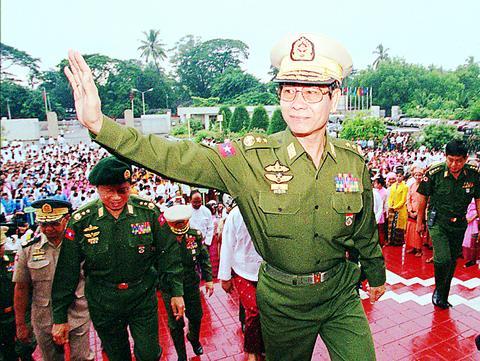Myanmar's state radio and television announced yesterday that Prime Minister General Khin Nyunt has been replaced by a hardline member of the country's ruling military junta, Lieutenant General Soe Win.
The brief announcement said Khin Nyunt was "permitted to retire for health reasons," a euphemism used in the past for the forced ouster of Cabinet members.

PHOTO: AP
The radio said Soe Win would become the new prime minister, moving from his high-ranking post of secretary-1 of the junta, which is officially called the State Peace and Development Council.
Both announcements were signed by the junta's supreme leader, Senior General Than Shwe.
Khin Nyunt, also head of military intelligence, had a reputation as a relative moderate compared to the more hardline generals who were his seniors.
Soe Win, 56, is believed to espouse a hard line in dealing with the country's pro-democracy movement, led by detained Nobel Peace Prize laureate Aung San Suu Kyi, and the country's foreign critics who want the army to hand over power to an elected government.
Soe Win is a former military commander of Myanmar's Sagaing region in the northwest who became air defense chief in November 2001.
He joined the junta as secretary-2 in February 2003, and was promoted to secretary-1 in an August 2003 Cabinet shake-up, replacing Khin Nyunt, who became prime minister.
Khin Nyunt's move to the prime minister's post last year was interpreted by some as a gesture toward reconciliation with the pro-democracy movement, while other analysts thought Soe Win's promotion was more significant.
He is believed by some diplomats and government critics to have been involved in a May 2003 attack on Suu Kyi and her followers in northern Myanmar by a mob of government supporters. Suu Kyi has been detained since the attack.
Yesterday's announcement said Soe Win would be succeeded as secretary-1 by Lieutenant General Thein Sein, moving up a step in the junta's hierarchy.
No announcement was made of who would replace Khin Nyunt in the influential post of military intelligence chief.

MAKING WAVES: China’s maritime militia could become a nontraditional threat in war, clogging up shipping lanes to prevent US or Japanese intervention, a report said About 1,900 Chinese ships flying flags of convenience and fishing vessels that participated in China’s military exercises around Taiwan last month and in January have been listed for monitoring, Coast Guard Administration (CGA) Deputy Director-General Hsieh Ching-chin (謝慶欽) said yesterday. Following amendments to the Commercial Port Act (商港法) and the Law of Ships (船舶法) last month, the CGA can designate possible berthing areas or deny ports of call for vessels suspected of loitering around areas where undersea cables can be accessed, Oceans Affairs Council Minister Kuan Bi-ling (管碧玲) said. The list of suspected ships, originally 300, had risen to about 1,900 as

Right-wing political scientist Laura Fernandez on Sunday won Costa Rica’s presidential election by a landslide, after promising to crack down on rising violence linked to the cocaine trade. Fernandez’s nearest rival, economist Alvaro Ramos, conceded defeat as results showed the ruling party far exceeding the threshold of 40 percent needed to avoid a runoff. With 94 percent of polling stations counted, the political heir of outgoing Costa Rican President Rodrigo Chaves had captured 48.3 percent of the vote compared with Ramos’ 33.4 percent, the Supreme Electoral Tribunal said. As soon as the first results were announced, members of Fernandez’s Sovereign People’s Party

MORE RESPONSIBILITY: Draftees would be expected to fight alongside professional soldiers, likely requiring the transformation of some training brigades into combat units The armed forces are to start incorporating new conscripts into combined arms brigades this year to enhance combat readiness, the Executive Yuan’s latest policy report said. The new policy would affect Taiwanese men entering the military for their compulsory service, which was extended to one year under reforms by then-president Tsai Ing-wen (蔡英文) in 2022. The conscripts would be trained to operate machine guns, uncrewed aerial vehicles, anti-tank guided missile launchers and Stinger air defense systems, the report said, adding that the basic training would be lengthened to eight weeks. After basic training, conscripts would be sorted into infantry battalions that would take

GROWING AMBITIONS: The scale and tempo of the operations show that the Strait has become the core theater for China to expand its security interests, the report said Chinese military aircraft incursions around Taiwan have surged nearly 15-fold over the past five years, according to a report released yesterday by the Democratic Progressive Party’s (DPP) Department of China Affairs. Sorties in the Taiwan Strait were previously irregular, totaling 380 in 2020, but have since evolved into routine operations, the report showed. “This demonstrates that the Taiwan Strait has become both the starting point and testing ground for Beijing’s expansionist ambitions,” it said. Driven by military expansionism, China is systematically pursuing actions aimed at altering the regional “status quo,” the department said, adding that Taiwan represents the most critical link in China’s